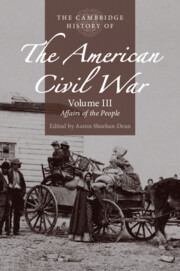Book contents
- The Cambridge History of the American Civil War
- The Cambridge History of the American Civil War
- The Cambridge History of the American Civil War
- Copyright page
- Contents
- Plates
- Figures
- Contributors to Volume III
- Note on the Text
- Part I Values
- Part II Social Experience
- 6 Families in the Civil War
- 7 Refugees and Movement in the Civil War
- 8 Citizen Soldiers
- 9 Immigrant America and the Civil War
- 10 Emancipation and War
- 11 The Black Military Experience
- 12 Motives and Morale
- 13 Urban and Rural America in the Civil War
- Part III Outcomes
- Index
- Plate Section (PDF Only)
- References
12 - Motives and Morale
from Part II - Social Experience
Published online by Cambridge University Press: 11 October 2019
- The Cambridge History of the American Civil War
- The Cambridge History of the American Civil War
- The Cambridge History of the American Civil War
- Copyright page
- Contents
- Plates
- Figures
- Contributors to Volume III
- Note on the Text
- Part I Values
- Part II Social Experience
- 6 Families in the Civil War
- 7 Refugees and Movement in the Civil War
- 8 Citizen Soldiers
- 9 Immigrant America and the Civil War
- 10 Emancipation and War
- 11 The Black Military Experience
- 12 Motives and Morale
- 13 Urban and Rural America in the Civil War
- Part III Outcomes
- Index
- Plate Section (PDF Only)
- References
Summary
For both the United States and the Confederacy, motivation’s essence was a patriotic commitment to defend the liberty bequeathed to Americans by the nation’s founding generation. Exactly what defending liberty meant, however, depended upon sectional understandings of the critical elements of a good society and a just government. One thing was clear to Northerners: there could be no liberty outside of the protection of the old Constitution and the union it had created. Patriots living in the fledgling Confederacy, however, defended secession as a conservative necessity in the face of Northern ideological innovation that challenged their very way of life.
- Type
- Chapter
- Information
- The Cambridge History of the American Civil War , pp. 242 - 263Publisher: Cambridge University PressPrint publication year: 2019



